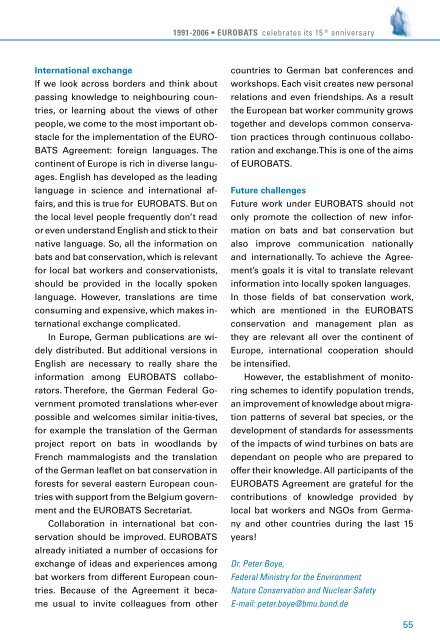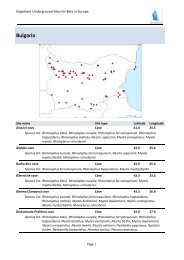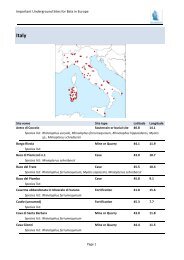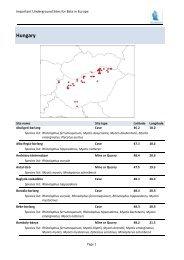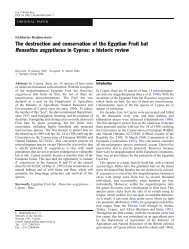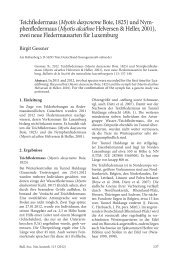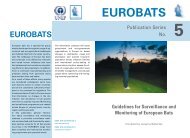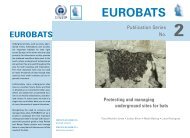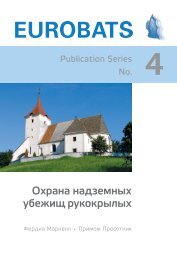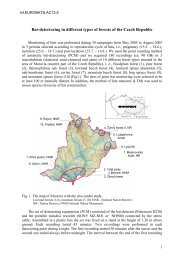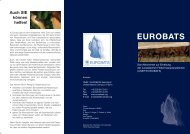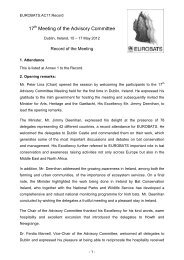1991 - 2006. EUROBATS celebrates its 15th anniversary
1991 - 2006. EUROBATS celebrates its 15th anniversary
1991 - 2006. EUROBATS celebrates its 15th anniversary
Create successful ePaper yourself
Turn your PDF publications into a flip-book with our unique Google optimized e-Paper software.
International exchange<br />
If we look across borders and think about<br />
passing knowledge to neighbouring coun-<br />
tries, or learning about the views of other<br />
people, we come to the most important ob-<br />
stacle for the implementation of the EURO-<br />
BATS Agreement: foreign languages. The<br />
continent of Europe is rich in diverse langu-<br />
ages. English has developed as the leading<br />
language in science and international af-<br />
fairs, and this is true for <strong>EUROBATS</strong>. But on<br />
the local level people frequently don’t read<br />
or even understand English and stick to their<br />
native language. So, all the information on<br />
bats and bat conservation, which is relevant<br />
for local bat workers and conservationists,<br />
should be provided in the locally spoken<br />
language. However, translations are time<br />
consuming and expensive, which makes in-<br />
ternational exchange complicated.<br />
In Europe, German publications are wi-<br />
dely distributed. But additional versions in<br />
English are necessary to really share the<br />
information among <strong>EUROBATS</strong> collabo-<br />
rators. Therefore, the German Federal Go-<br />
vernment promoted translations wher-ever<br />
possible and welcomes similar initia-tives,<br />
for example the translation of the German<br />
project report on bats in woodlands by<br />
French mammalogists and the translation<br />
of the German leaflet on bat conservation in<br />
forests for several eastern European coun-<br />
tries with support from the Belgium govern-<br />
ment and the <strong>EUROBATS</strong> Secretariat.<br />
Collaboration in international bat con-<br />
servation should be improved. <strong>EUROBATS</strong><br />
already initiated a number of occasions for<br />
exchange of ideas and experiences among<br />
bat workers from different European coun-<br />
tries. Because of the Agreement it beca-<br />
me usual to invite colleagues from other<br />
<strong>1991</strong>-2006 • <strong>EUROBATS</strong> <strong>celebrates</strong> <strong>its</strong> 15 th <strong>anniversary</strong><br />
countries to German bat conferences and<br />
workshops. Each visit creates new personal<br />
relations and even friendships. As a result<br />
the European bat worker community grows<br />
together and develops common conserva-<br />
tion practices through continuous collabo-<br />
ration and exchange. This is one of the aims<br />
of <strong>EUROBATS</strong>.<br />
Future challenges<br />
Future work under <strong>EUROBATS</strong> should not<br />
only promote the collection of new infor-<br />
mation on bats and bat conservation but<br />
also improve communication nationally<br />
and internationally. To achieve the Agree-<br />
ment’s goals it is vital to translate relevant<br />
information into locally spoken languages.<br />
In those fields of bat conservation work,<br />
which are mentioned in the <strong>EUROBATS</strong><br />
conservation and management plan as<br />
they are relevant all over the continent of<br />
Europe, international cooperation should<br />
be intensified.<br />
However, the establishment of monito-<br />
ring schemes to identify population trends,<br />
an improvement of knowledge about migra-<br />
tion patterns of several bat species, or the<br />
development of standards for assessments<br />
of the impacts of wind turbines on bats are<br />
dependant on people who are prepared to<br />
offer their knowledge. All participants of the<br />
<strong>EUROBATS</strong> Agreement are grateful for the<br />
contributions of knowledge provided by<br />
local bat workers and NGOs from Germa-<br />
ny and other countries during the last 1<br />
years!<br />
Dr. Peter Boye,<br />
Federal Ministry for the Environment<br />
Nature Conservation and Nuclear Safety<br />
E-mail: peter.boye@bmu.bund.de


